Revisiting “The Long-Legged House”
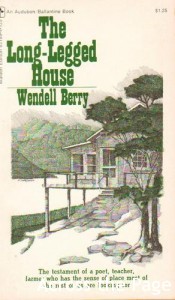 I’ve been rereading one of Wendell Berry’s early works, the title essay of his first published collection The Long-Legged House. He describes a camp on the riverbank, built by his great-uncle, and its significance to him over the course of his life. Eventually, Berry rebuilds (partially recycles, using walls and materials from the original house) the camp further up the bank and it comes to be his writing place.
I’ve been rereading one of Wendell Berry’s early works, the title essay of his first published collection The Long-Legged House. He describes a camp on the riverbank, built by his great-uncle, and its significance to him over the course of his life. Eventually, Berry rebuilds (partially recycles, using walls and materials from the original house) the camp further up the bank and it comes to be his writing place.
Among other things. Over the course of his life, the camp is a solitary retreat, a place where a confused adolescent gains a sense of stability, a place where he does some of his most important reading, a place where he and his wife spend the first three months of their marriage, a place where he awakens to his sense of calling and purpose, as writer and as human being.
The last time I read this, I was a graduate student. It was different this time, reading it as a wife and mother and home schooler. I noticed different things, and I’m ashamed to say I felt something like envy at Berry’s good fortune in having such a place, and so many opportunities for quiet reflection. But I also felt the sense of kinship that first drew me to his writings.
The importance of Berry’s voice in my life started with the first book I read, The Memory of Old Jack, and the recognition I felt when I saw in Jack Beechum some of my own feelings and values. With “The Long-Legged House,” I felt even more strongly this time that sense of recognition. It’s in this camp beside the river that the desire to know his place is kindled in Berry. He becomes aware that the earth is not simply an “inert surface that man lives upon and uses,” but a whole interrelated network of relationships that he lives more within than upon. “We are the belongings of the world, not its owners,” he realizes. As he reads and writes and thinks there, he looks out at the natural surroundings and begins to notice things he’s never really paid concentrated attention to before.
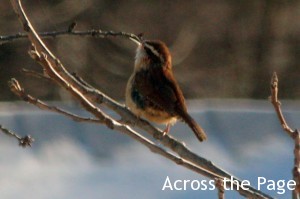
It was thrilling to recognize so many of the very things I’m noticing this year too, as our family has embarked on our nature study journey: a squirrel building its nest, who never carries its mouthful of leaves up the tree but takes a complicated route involving many blind leaps instead; the Carolina wren, who belts out his song “as though he could not bear to live except in the atmosphere of his own music”; titmice and chickadees scolding an owl, letting loose “a great backlog of invective” as they seem to dare one another to get ever closer to the owl’s sleeping place; the discovery of the warblers. He learns the names of trees and flowers and birds. He gets a pair of binoculars that “enlarge and intensify” his awareness in much the same way the camera has begun to do for me this year.
One of Berry’s great predecessors in the nature writing genre is Aldo Leopold, whose Sand County Almanac laid out the case for what he called a “land ethic” in terms compelling enough that many acknowledge him as the father of conservation. In “The Long-Legged House,” Berry is writing about the emerging relationship between himself and his place. But he is modelling something I see happening in my family, too. One of the things I have wanted to give my daughters is a few places to love, a few places where we are coming to know what Berry would call “the nonhuman life” of the place. We don’t have a large plot of land or a camp by the river, but we have some preserves we’re so grateful we can visit and explore, and we’ve found within them some favorite niches. That love is the beginning of a land ethic. (Is love the beginning of all ethics?)
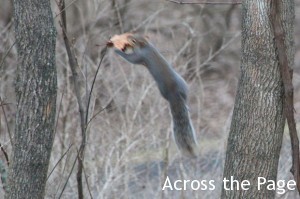
Berry has written many essays over the years, but these early ones are my favorites. They have all the exuberance and deep conviction of discovery. Reading them, I feel affirmed and inspired in some of my own much more fumbling attempts to guide my children toward a richer comprehension of the world and their own lives. Berry was a young man when he wrote these essays; I’m in my forties. But I can relate to the delight and sense of gathering momentum that seem to emanate from the pages of “The Long-Legged House.” It’s the delight of awakening to a goodness in the world, goodness under threat and unobtrusive, but still available to anyone who will notice. Somehow, in some way I don’t understand yet, I feel that venturing out into that world is a part of what Berry calls “a journey from the sound of public voices to the sound of a private quiet voice rising falteringly out of the roots of my mind.”
I’m grateful for the hours Wendell Berry spent before his 40-paned window beside the river, writing about what was unfolding before his eyes and within his character. It confirms me as I sit at my kitchen table, taking in the activity in the brush out back and letting my eye wander to the hills across the Susquehanna a few miles away. Sometimes it’s our most deeply held ideals that seem to emerge most falteringly in our lives. (Why is that?) We need authors who breathe life into them by going before us and putting them into words more eloquent than any we could come up with ourselves, and taking them farther than we can currently see. Berry reminds me that something as simple as looking out the window can become a vehicle for the gathering and clarifying of a life.


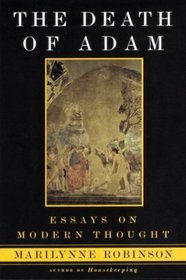
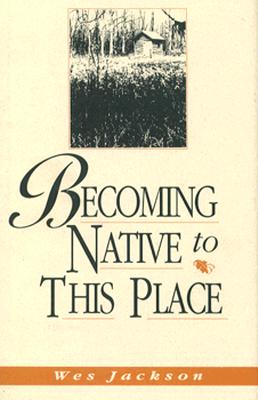
4 Comments
Carrie, Reading to Know
I wish to go to that camp. Yes, yes, I do!
Amy @ Hope Is the Word
Well, this is just lovely, Janet. I need to get back to WB.
Barbara H.
Love that last paragraph especially. Maybe that’s one reason I have always enjoyed reading.
Jess
I agree with Barbara, that last paragraph especially is just right.